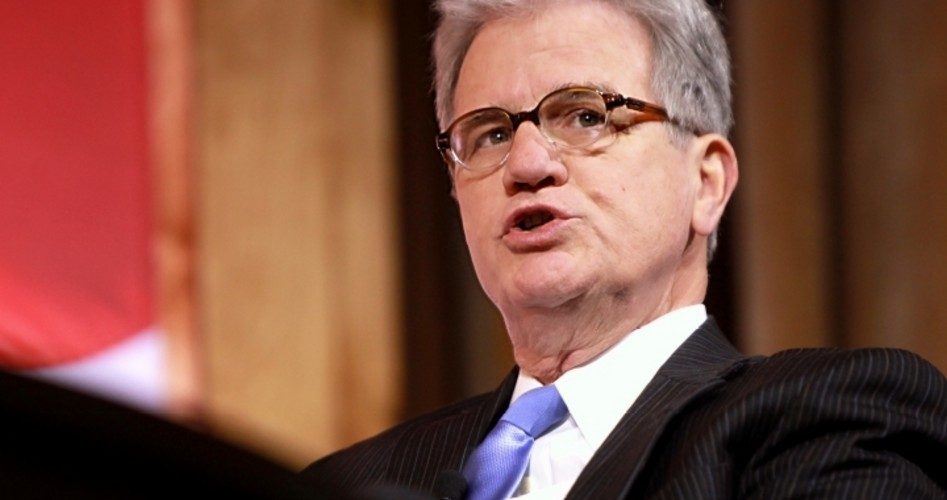
Podcast: Play in new window | Download ()
Subscribe: Android | RSS | More
On March 28, the day after President Trump signed the CARES Act into law, former U.S. Senator Tom Coburn (R-Okla.) passed away. Had he lived, and had his health allowed, he would certainly have voted against it. His annual “Wastebook” was eagerly awaited by fiscal conservatives, and largely ignored by everyone else in the Senate.
The CARES Act had everything in it that Coburn opposed. As Kimberly Strassel wrote in the Wall Street Journal, “The bill throws $25 billion more at food stamps and child nutrition; $12 billion at housing; $3.5 billion to states for child care; $32 billion at education; $900 million at low-income heating assistance; $50 million at legal services for the poor and so on. This is a massive expansion of the welfare state, seemingly with no regard to the actual length of this crisis.”
She added:
There’s also the money appropriators threw at government for no purpose other than the throwing. Every outpost gets dollars, most for nothing more than the general command “to prevent, prepare for, and respond to coronavirus.” NASA gets $60 million. Has the virus infected the sun’s corona? The National Archives gets $8 million. Will it put the virus on display? Many departments get cash for research, regardless of their relevance to today’s medical crisis. Perhaps the Energy Department will use its additional $99 million in “science” to gauge how the virus responds in a nuclear reactor.
Without knowing it, Strassel provided a perfect epitaph for the Senator from Oklahoma back in 2015, writing, “The pity is that history rarely hands out awards to those who stop bad things. Tom Coburn blocked more ideas and lousy legislation in Congress than most Americans will ever know.”
He used a tool called a “hold” to block offensive legislation and managed to offend members on both sides of the aisle. Democrats called him “Dr. No,” intending it as a pejorative. Instead it became an honorary title, memorializing a member, first of the House and then the Senate, who promised to uphold and defend the Constitution and to serve no more than three consecutive terms, and who kept his promises.
He compiled a Constitutional voting record that is nearly unmatched today: a lifetime rating of 83 out of 100 for The New American’s Freedom Index. His Freedom Index score was never lower than 65, and hit 97 out of 100 in the 111th Congress (2009-2010).
Coburn battled cancer since he was 28, and it cost him his life at age 72. It changed his career path, turning him to a career in medicine, during which he treated more than 15,000 patients and delivered more than 4,000 babies. He entered the House during the “Republican Revolution” in 1994 when the Republican Party ran on Newt Gingrich’s Contract with America. That “contract” promised a smaller government, lower taxes, and a rejuvenation of the private sector. When Gingrich failed to perform, Coburn publicly criticized the speaker for instead pushing the government to the left.
In his 2003 book Breach of Trust: How Washington Turns Outsiders Into Insiders, Coburn revealed how most members of Congress behave once they’ve drunk the Washington Kool-Aid. The New York Times reported that Coburn’s contempt for D.C. insiders was “genuine, bipartisan and in many cases mutual. He once prescribed a ‘spinal transplant’ for 70 percent of the Senate, and another time said his colleagues had ‘reproductive organs the size of BBs.’”
While his intentions were certainly good, his solutions to government profligacy were sometimes flawed. Toward the end of his life, Coburn joined Citizens for Self-Governance as a senior advisor to the group’s Convention of States project, calling for an Article V convention. It was a move that suggested that amendments to the existing Constitution were necessary to rein in big government. It was, and remains, a move opposed by constitutionalist organizations such as The John Birch Society.
This writer attended one of Coburn’s presentations in favor of an Article V convention and had a chance to ask the former senator, “Why do you think members of Congress would follow new rules when they don’t follow the present ones?” Coburn responded, “We’ll have to make them accountable.”
But if the politicians are truly accountable and follow the Constitution, there would be no need for additional amendments. This is what organizations such as The John Birch Society have been saying since its founding in 1958. All that is needed, said JBS founder Robert Welch, is to educate citizens about the marvelous document the Founders bequeathed to them, and they’ll know what to do from there: “All we must find, and build, and use, to win, is sufficient understanding.”
As a member of the House and the Senate, Tom Coburn helped mightily in the cause for limited government. He will be missed.
Image: flickr.com / Gage Skidmore
An Ivy League graduate and former investment advisor, Bob is a regular contributor to The New American, writing primarily on economics and politics. He can be reached at [email protected].

